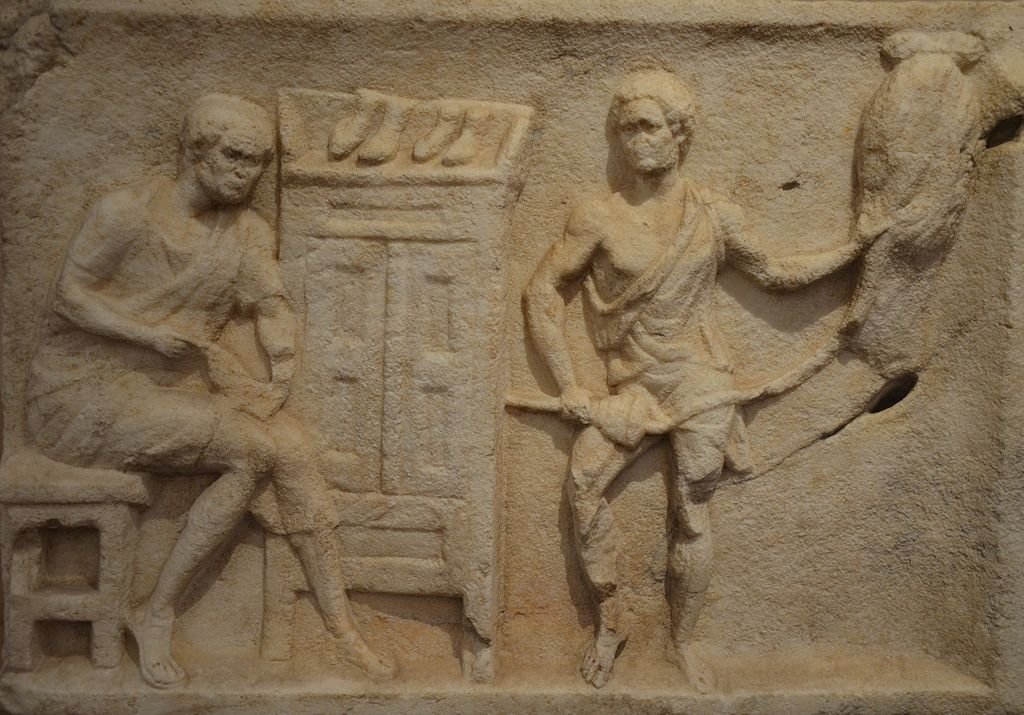The first Socratic dialogues: Simon the Shoemaker
“Simon the Athenian, a shoemaker. When Socrates used to come to his workshop and have a conversation about something, Simon would make notes of the things he would remember. That’s why his dialogues are called ‘shoemakers.’ There are thirty-three of them bound in one book:
On the gods.
On the good.
On the beautiful.
What is the beautiful?
On justice: books one and two.
On virtue, that it can be taught.
On courage: books one, two and three.
On law.
On popular leadership (sc. demagogy).
On honor.
On poetry.
On luxuries.
On love.
On philosophy.
On knowledge.
On music.
On poetry.
What is the beautiful? [repeated]
On teaching.
On having conversations.
On judgment.
On being.
On numbers.
On taking care.
On working.
On greed.
On charlatans.
On the beauitful. [repeated]
Some add:
On deliberating.
On reason or on suitability.
On wrong-doing.
They say that he was the first to present Socratic discussions (arguments?) as dialogues. When Pericles promised to support him and requested that he come to him, he responded that his free speech was not for sale.
There was also another Simon who wrote on rhetorical arts; another was a doctor during the reign of Seleucus Nicanor; and another was a sculptor.”
Σίμων Ἀθηναῖος, σκυτοτόμος. οὗτος ἐρχομένου Σωκράτους ἐπὶ τὸ ἐργαστήριον καὶ διαλεγομένου τινά, ὧν ἐμνημόνευεν ὑποσημειώσεις ἐποιεῖτο: ὅθεν σκυτικοὺς αὐτοῦ τοὺς διαλόγους καλοῦσιν. εἰσὶ δὲ τρεῖς καὶ τριάκοντα ἐν ἑνὶ φερόμενοι βιβλίῳ:
Περὶ θεῶν.
Περὶ τοῦ ἀγαθοῦ.
Περὶ τοῦ καλοῦ.
Τί τὸ καλόν.
Περὶ δικαίου πρῶτον, δεύτερον.
Περὶ ἀρετῆς ὅτι οὐ διδακτόν.
Περὶ ἀνδρείας πρῶτον, δεύτερον, τρίτον.
Περὶ νόμου.
Περὶ δημαγωγίας.
Περὶ τιμῆς.
Περὶ ποιήσεως.
Περὶ εὐπαθείας.
Περὶ ἔρωτος.
Περὶ φιλοσοφίας
Περὶ ἐπιστήμης.
Περὶ μουσικῆς.
Περὶ ποιήσεως.
Τί τὸ καλόν.
Περὶ διδασκαλίας.
Περὶ τοῦ διαλέγεσθαι.
Περὶ κρίσεως.
Περὶ τοῦ ὄντος.
Περὶ ἀριθμοῦ.
Περὶ ἐπιμελείας.
Περὶ τοῦ ἐργάζεσθαι.
Περὶ φιλοκερδοῦς.
Περὶ ἀλαζονείας.
Περὶ τοῦ καλοῦ.
οἱ δέ,
Περὶ τοῦ βουλεύεσθαι.
Περὶ λόγου ἢ περὶ ἐπιτηδειότητος.
Περὶ κακουργίας.
Οὗτος, φασί, πρῶτος διελέχθη τοὺς λόγους τοὺς Σωκρατικούς. ἐπαγγειλαμένου δὲ Περικλέους θρέψειν αὐτὸν καὶ κελεύοντος ἀπιέναι πρὸς αὐτόν, οὐκ ἂν ἔφη τὴν παρρησίαν ἀποδόσθαι.
Γέγονε δὲ καὶ ἄλλος Σίμων ῥητορικὰς τέχνας γεγραφώς: καὶ ἕτερος ἰατρὸς κατὰ Σέλευκον τὸν Νικάνορα: καί τις ἀνδριαντοποιός.
Diogenes Laertius, Lives of the Philosophers, 2.13
From Plutarch’s “That philosophers should converse especially with those in power.”
‘To embrace Sorkanos, and to honour, share, welcome and cultivate a friendship that will be useful and fruitful to many both privately and publically, is an act that belongs to one who loves what is noble, who is political, who is a friend to people; not, as some think, one who loves reputation. On the contrary, the person who loves reputation and fears every whisper is the one who flees from and fears being known as an eager servant of those in power. Since what does a man say who is a servant and in need of philosophy? “Should I then become Simon the shoemaker or Dionysios the school teacher from being Perikles or Cato, so that one might have a discussion and sit with me as Socrates did them?” And although Ariston of Chios, when criticized by the sophists for conversing with anyone who wished, said, “I wish the wild animals, too, could understand arguments that inspire towards virtue”, will we avoid becoming acquainted with the powerful and the leaders as if they were wild and untamed?’
Σωρκανὸν ἐγκολπίσασθαι καὶ φιλίαν τιμᾶν καὶ μετιέναι καὶ προσδέχεσθαι καὶ γεωργεῖν, πολλοῖς μὲν ἰδίᾳ πολλοῖς δὲ καὶ δημοσίᾳ χρήσιμον καὶ ἔγκαρπον γενησομένην, φιλοκάλων ἐστὶ καὶ πολιτικῶν καὶ φιλανθρώπων οὐχ ὡς ἔνιοι νομίζουσι φιλοδόξων· ἀλλὰ καὶ τοὐναντίον, φιλόδοξός ἐστι καὶ ψοφοδεὴς ὁ φεύγων καὶ φοβούμενος ἀκοῦσαι λιπαρὴς τῶν ἐν ἐξουσίᾳ καὶ θεραπευτικός. ἐπεὶ τί φησιν ἀνὴρ θεραπευτικὸς καὶ φιλοσοφίας δεόμενος; Σίμων οὖν γένωμαι ὁ σκυτοτόμος ἢ Διονύσιος ὁ γραμματιστὴς ἐκ Περικλέους ἢ Κάτωνος, ἵνα μοι προσδιαλέγηται καὶ προσκαθίζῃ ὡς Σωκράτης ἐκείνῳ; καὶ Ἀρίστων μὲν ὁ Χῖος ἐπὶ τῷ πᾶσι διαλέγεσθαι τοῖς βουλομένοις ὑπὸ τῶν σοφιστῶν κακῶς ἀκούων “ὤφελεν,” εἶπε, “καὶ τὰ θηρία λόγων συνιέναι κινητικῶν πρὸς ἀρετήν”· ἡμεῖς δὲ φευξούμεθα τοῖς δυνατοῖς καὶ ἡγεμονικοῖς ὥσπερ ἀγρίοις καὶ ἀνημέροις γίγνεσθαι συνήθεις;
Plutarch, Maxime cum principibus philosopho esse disserendum, Moralia 776A–C



